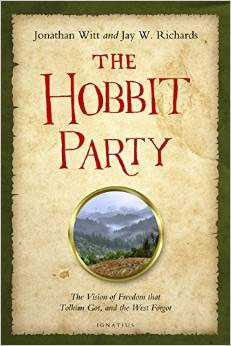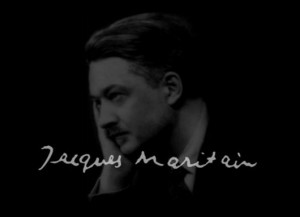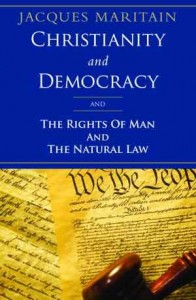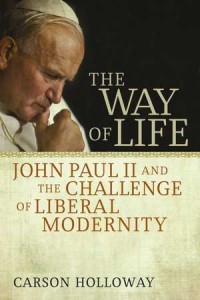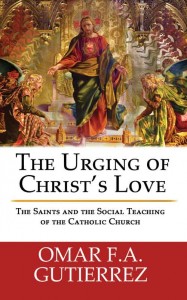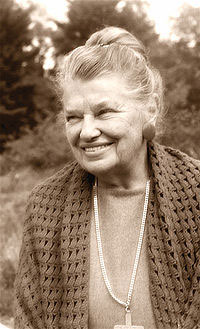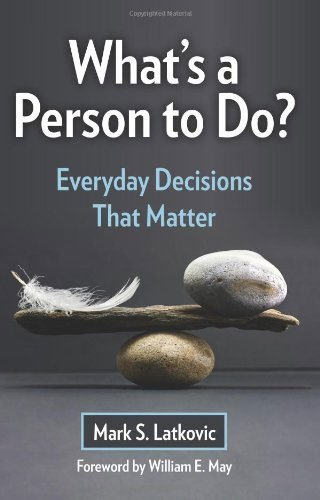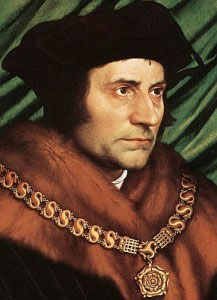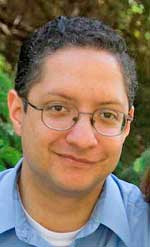
Omar F. A. Gutierrez
Episode 1 – Regnum Novum: Bringing forth the New Evangelization through Catholic Social Teaching with Omar Guiterrez – Introduction and Value # 1 – Jesus Christ
[powerpress]
From episode … 1.     Jesus Christ
You may not believe how many advocates of social justice are only too ready to chuck Jesus out the window in order to get you to buy their plan. One such program of which I’m familiar actually includes materials that deny the divinity of Christ, several times, and deny the salvific work of the cross. As Pope Paul VI and Pope Benedict XVI have said, the Social Doctrine is evangelization. If it is not rooted in the truth, then it can be manipulated to mean whatever one wants it to mean. The truth is quite simply, Jesus Christ who, as Gaudium et spes states, reveals man to himself. The Social Doctrine and the work of charity must stem from an intimate knowledge of Jesus Christ so that they might serve the whole person and point back to Christ.
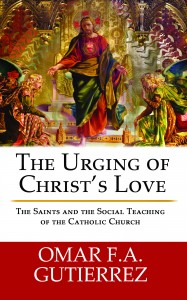 Omar F. A. Guiterrez, M.A. , Special Assistant  to Archbishop George Lucas of the Archdiocese of Omaha.  He’s also the author of “The Urging of Christ’s Love:  The Saints and The Social Teaching of the Catholic”
Omar F. A. Guiterrez, M.A. , Special Assistant  to Archbishop George Lucas of the Archdiocese of Omaha.  He’s also the author of “The Urging of Christ’s Love:  The Saints and The Social Teaching of the Catholic”
Also visit Omar’s “Discerning Hearts” page Catholic Social Teaching 101
This entry was posted on Tuesday, December 2nd, 2014 at 11:46 am
You can follow any responses to this entry through the RSS 2.0 feed.
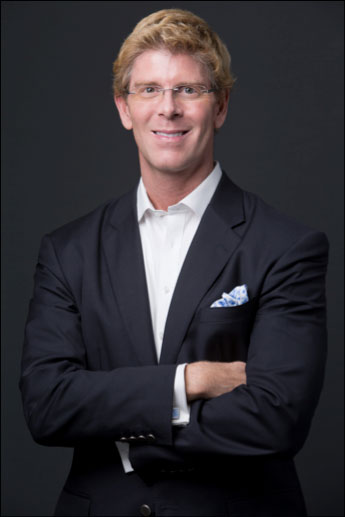 What fun!  I love reading and discussing great authors and their work (especially if it’s someone of the caliber of J. R. R. Tolkien) . Throw into the mix the fundamentals of Catholic Social teaching, a bit of religion, history and politics  and suddenly you have a party…“The Hobbit Party: The Vision of Freedom That Tolkien Got, and the West Forgot “ to be exact.  Much has written about Tolkien’s religious connotations in “The Hobbit” and “Lord of the Rings”, but authors Jay Richards and Jonathon Witt delve interestingly enough into the political aspects of the novels.  For fans of the books (and/or the movies for that matter), this a wonderful source of light which illuminates yet another facet of Tolkien’s incredible literary diamond.  Dr. Jay Richards is always great to talk with and what a joy to engage on this topic.
What fun!  I love reading and discussing great authors and their work (especially if it’s someone of the caliber of J. R. R. Tolkien) . Throw into the mix the fundamentals of Catholic Social teaching, a bit of religion, history and politics  and suddenly you have a party…“The Hobbit Party: The Vision of Freedom That Tolkien Got, and the West Forgot “ to be exact.  Much has written about Tolkien’s religious connotations in “The Hobbit” and “Lord of the Rings”, but authors Jay Richards and Jonathon Witt delve interestingly enough into the political aspects of the novels.  For fans of the books (and/or the movies for that matter), this a wonderful source of light which illuminates yet another facet of Tolkien’s incredible literary diamond.  Dr. Jay Richards is always great to talk with and what a joy to engage on this topic.
[powerpress]
You can find the book here
“J. R. R. Tolkien is one of the most widely read but arguably misunderstood of the twentieth century’s literary geniuses. In this book, Witt and Richards lift the veil on Tolkien and reveal a political and, yes, economic thinker who constantly surprises readers and whose insights are even more valuable for our time than his own. Tolkien fans who read this book will never think about this great author the same way again.”
— Samuel Gregg, Research Director, Acton Institute Author, Becoming Europe
“This book is a ‘drop everything and read it’ book. Richards and Witt have opened up an often ignored aspect of Tolkien’s work, namely the sense in which his myth bespeaks a political and economic order that stands in stark, even violent, contrast to the presiding power structures that dominate this unhappy globe. It should be made required reading in all courses in political philosophy. It’s a glorious book.”
— Thomas Howard, Author, Dove Descending: A Journey into T. S. Eliot’s “Four Quartets”
This entry was posted on Monday, December 1st, 2014 at 5:28 am
You can follow any responses to this entry through the RSS 2.0 feed.
Dr. Raymond Dennehy was a delight to talk to about the work and influence of 20th century French philosopher 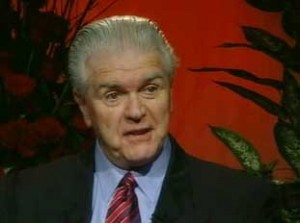 Jacques Maritain.  Ignatius Press has published in a special one volume set,  Maritain’s “Christianity and Democracy and the Rights of Man and the Natural Law”, which provides key insights for Christians in shaping the political and social orders.
Jacques Maritain.  Ignatius Press has published in a special one volume set,  Maritain’s “Christianity and Democracy and the Rights of Man and the Natural Law”, which provides key insights for Christians in shaping the political and social orders.
[powerpress]
Jacques Maritain was one of the principal exponents of Thomism, the philosophy of Saint Thomas Aquinas, in the modern world. He lived for many years in the United States, and taught at Princeton University and Columbia University. After WWII, he served as the French ambassador to the Vatican. He also helped draft the United Nations Universal Declaration of Human Rights (1948).
 You can find the book here
- “Maritain was one of the pioneers of the Catholic human rights revolution, which changed the course of 20th century politics. While helping the Church through a genuine development of social doctrine, Maritain helped forge some of the tools that eventually broke through the Berlin Wall.†– George Weigel, Ethics and Public Policy Center
“In these passionate words one encounters the mind of Maritain in all its vigor and variety. His reflections on the challenges facing the world’s democratic experiments – starkly realistic yet infused with Christian hope – are as timely today as they were seventy years ago.†– Mary Ann Glendon, Harvard University
“This has been one of my all-time favorite ‘David books’ – those little books that take down Goliaths. Almost single-handedly, Maritain launched a hypothesis on the Christian (and Jewish) origins of the foundational axioms of democracy, of which many atheists are now coming to admit the truth. The sheer power of his hypothesis is more evident with every passing year. The republication of this classic is therefore bound to kindle longing for a deeper, more just reevaluation.†– Michael Novak, American Enterprise Institute
Tags: catholic, catholic podcast, catholic prayer, cathollc spirituality, Jacques Maritain, Michael Novak, modern democracy, philosophy, political philosophers, Raymond Dennehy, work
This entry was posted on Saturday, July 12th, 2014 at 12:06 am
You can follow any responses to this entry through the RSS 2.0 feed.
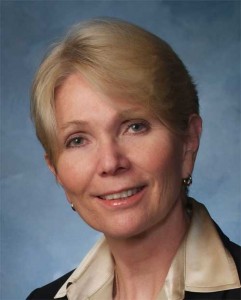 “Non-Negotiable: Essential Principles of a Just Society and Humane Culture” by Sheila Liaugminas is a fantastic book which clearly articulates the essence of Catholic Social Doctrine, especially those teachings which touch the lives of Catholic Americans. She addresses important challenges many face in the arena of politics and cultural relativism and offers solid guidance in the struggle to restore respect for human dignity.   Excellent!
“Non-Negotiable: Essential Principles of a Just Society and Humane Culture” by Sheila Liaugminas is a fantastic book which clearly articulates the essence of Catholic Social Doctrine, especially those teachings which touch the lives of Catholic Americans. She addresses important challenges many face in the arena of politics and cultural relativism and offers solid guidance in the struggle to restore respect for human dignity.   Excellent!
[powerpress]
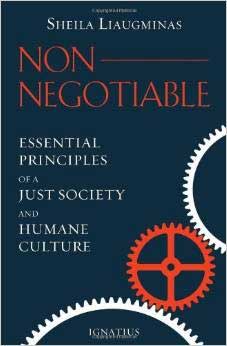 You can find the book here
You can find the book here
“I truly admire Sheila Liaugminas. She is an outstanding journalist. We have dialogued extensively on her radio program about the rights of conscience and the protection of what we call our ‘first principles.’ Sheila has laid out in great breadth and depth the need for a revived understanding of the essentials of human dignity and societal organization.”
– Jeff Fortenberry, Member of Congress
“Both Pope Benedict XVI and Pope Francis have spoken of the ‘dictatorship of relativism’ in our world today and its negative impacts not just on our faith, but to the common good of society. Shelia Liaugminas draws upon the universal principle of natural human rights and dignity to address several contemporary moral issues which have suffered as a result of a relativistic mindset. Her book is a valuable resource in the struggle to restore a true, just and virtuous society.”
– Most Reverend Thomas Paprocki, Bishop of Springfield, Illinois
Tags: catholic, catholic podcast, catholic prayer, cathollc spirituality
This entry was posted on Tuesday, June 24th, 2014 at 4:31 pm
You can follow any responses to this entry through the RSS 2.0 feed.
WOL6 – Episode 6-  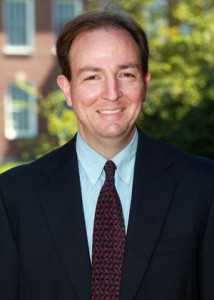 “Democracy in America” by Alexis de Tocqueville is the focus of this episode.  What is “democracy” and why did it work it in the American experience.  There is much that is good and sound in the founding of “modern western democracy”, but what has happened in the view of “Evangelium Vitae” that has possible knocked it off track.
“Democracy in America” by Alexis de Tocqueville is the focus of this episode.  What is “democracy” and why did it work it in the American experience.  There is much that is good and sound in the founding of “modern western democracy”, but what has happened in the view of “Evangelium Vitae” that has possible knocked it off track.
The Way of Life, Carson Holloway examines the fundamental philosophers of modernity-from Hobbes to Toqueville-to suggest that St. John Paul II’s critique of modernity is intended not to reject, but to improve. Thus, claims Holloway, it is appropriate for liberal modernity to attend to the Pope’s thought, receiving it not as the attack of an enemy but as the criticism of a candid friend.
  For other episodes in the series visit Dr. Holloway’s Discerning Hearts page
This series is based on Dr. Holloway’s book “The Way of Life”
Tags: catholic, catholic podcast, catholic prayer, cathollc spirituality, st. john paul ii
This entry was posted on Tuesday, June 24th, 2014 at 12:58 pm
You can follow any responses to this entry through the RSS 2.0 feed.
WOL5 – Episode 5-   The  “Declaration of Independence” and American political philosophy and what it involves.  What is the “natural law” and how it applies to political thought.  There are principals of political “rights and wrongs” and these are the foundations for political practice (which are not always followed by the human person).  What are the “self-evident” truths?  What are “natural rights”?  Why did this system of thought survive given the American experience compared to the results of the French revolution and its theories?  Both might be “children” of the Enlightenment, but one was hostile to Christianity, the other embraced it. [powerpress]
The  “Declaration of Independence” and American political philosophy and what it involves.  What is the “natural law” and how it applies to political thought.  There are principals of political “rights and wrongs” and these are the foundations for political practice (which are not always followed by the human person).  What are the “self-evident” truths?  What are “natural rights”?  Why did this system of thought survive given the American experience compared to the results of the French revolution and its theories?  Both might be “children” of the Enlightenment, but one was hostile to Christianity, the other embraced it. [powerpress] 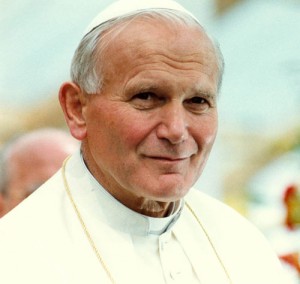
The Way of Life, Carson Holloway examines the fundamental philosophers of modernity-from Hobbes to Toqueville-to suggest that St. John Paul II’s critique of modernity is intended not to reject, but to improve. Thus, claims Holloway, it is appropriate for liberal modernity to attend to the Pope’s thought, receiving it not as the attack of an enemy but as the criticism of a candid friend.
  For other episodes in the series visit Dr. Holloway’s Discerning Hearts page
This series is based on Dr. Holloway’s book “The Way of Life”
Tags: catholic, catholic podcast, catholic prayer, cathollc spirituality
This entry was posted on Friday, May 16th, 2014 at 10:46 am
You can follow any responses to this entry through the RSS 2.0 feed.
A delight to discuss Catholic Social Teaching with Dr. Joseph Capizzi, Associate Professor of Moral Theology at the Catholic University of America. 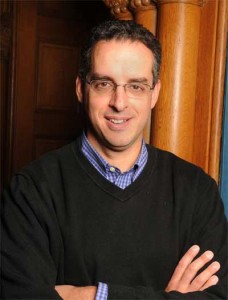  He is co-editor of a phenomenal new resource entitled “A Catechism for Business: Tough Ethical Questions and Insights from Catholic Teaching”.  A rare work which makes the complex issues of ethics,  found in our society, simple and accessible for lay faithful reflection and deeper study.  Truly, a must have, not only for thebusiness office, but for every Catholic home and parish.
 He is co-editor of a phenomenal new resource entitled “A Catechism for Business: Tough Ethical Questions and Insights from Catholic Teaching”.  A rare work which makes the complex issues of ethics,  found in our society, simple and accessible for lay faithful reflection and deeper study.  Truly, a must have, not only for thebusiness office, but for every Catholic home and parish.
[powerpress]
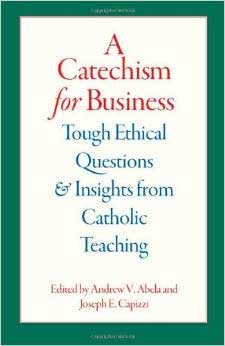 You can find the book here
You can find the book here
This is a brilliantly conceived and executed handbook. I imagine that it will be translated into many languages around the world. A Catechism for Business is the most practical handbook of Christian social teaching in relation to the vocation of persons in business ever produced.
Michael Novak, 1994 Templeton LaureateThe Church’s social teachings are a “best-kept secret” because they are often presented as answers without questions. Dr. Capizzi and Dean Abela have provided the questions, from the heart of the business enterprise, along with accurate but succinct responses from Catholic social doctrine. In their expert hands, the teaching has a chance to be heard.
Francis Cardinal George, O.M.I., Archbishop of ChicagoWork is not only a necessary activity but a beautiful expression of our creative nature, and this book is a vital resource for anyone who wishes to align work–and the workplace–according to God’s love and vision of the human person. Authors Abela and Capizzi do a great service to Christians in providing the most relevant Catholic teachings on the matters of labor, business, employment, wages, economic systems, and a myriad of related issues so relevant and so contentious in today’s world.
Carl Anderson, Supreme Knight, Knights of Columbus, and author, A Civilization of Love: What Every Catholic Can Do to Transform the World
Tags: Catechism, catholic, catholic podcast, catholic prayer, catholic social teaching, Catholic University of America, cathollc spirituality, Joseph Capizzi
This entry was posted on Thursday, May 15th, 2014 at 10:19 am
You can follow any responses to this entry through the RSS 2.0 feed.
WOL4 – Episode 4 –   The Scottish Enlightenment…what was it and why was it such an important movement to understand.  The influence of David Hume - Scottish philosopher, historian, economist, and essayist.  The flaw in Hume’s philosophy –  that self-interest is  stronger than sympathy, and if morality, according to Hume’s thinking,  is derived from the passions, then ultimately self-interest is a greater worth and motivator than sympathy.  This conflicts with the Christian understanding of the “Golden Rule” and fuels the Culture of Death…those in need become very vulnerable in the culture.
The Scottish Enlightenment…what was it and why was it such an important movement to understand.  The influence of David Hume - Scottish philosopher, historian, economist, and essayist.  The flaw in Hume’s philosophy –  that self-interest is  stronger than sympathy, and if morality, according to Hume’s thinking,  is derived from the passions, then ultimately self-interest is a greater worth and motivator than sympathy.  This conflicts with the Christian understanding of the “Golden Rule” and fuels the Culture of Death…those in need become very vulnerable in the culture.
[powerpress]
The Way of Life, Carson Holloway examines the fundamental philosophers of modernity-from Hobbes to Toqueville-to suggest that John Paul II’s critique of modernity is intended not to reject, but to improve. Thus, claims Holloway, it is appropriate for liberal modernity to attend to the Pope’s thought, receiving it not as the attack of an enemy but as the criticism of a candid friend.
 Â
For other episodes in the series visit Dr. Holloway’s Discerning Hearts page
This series is based on Dr. Holloway’s book “The Way of Life”
Tags: Carson Holloway, David Hume, Scottish Enlightenment
This entry was posted on Monday, April 21st, 2014 at 6:00 am
You can follow any responses to this entry through the RSS 2.0 feed.
Episode 39- Regnum Novum: Bringing forth the New Evangelization through Catholic Social Teaching with Omar Gutierrez  – We continue the study of the “Compendium of the Social Doctrine of the Church” Â Chapter 12 “Social Doctrine and Ecclesial Action”
– We continue the study of the “Compendium of the Social Doctrine of the Church” Â Chapter 12 “Social Doctrine and Ecclesial Action”
[powerpress]
CHAPTER TWELVE
SOCIAL DOCTRINE AND ECCLESIAL ACTION
I. PASTORAL ACTION IN THE SOCIAL FIELD
a. Social doctrine and the inculturation of faith
b. Social doctrine and social pastoral activity
c. Social doctrine and formation
d. Promoting dialogue
e. The subjects of social pastoral activity
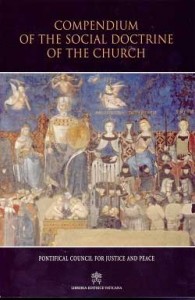
We live at a very special time. The confluence of many things has brought forth the clear need to be able to articulate the Social Teaching of the Catholic Church in a way that is accessible and applicable. This is not to be an effort where high-minded theories are to be bandied about. Rather, this is a time of opportunity wherein we can apply the Social Doctrine to the concrete so as to bring about a New Kingdom, a Revolution. – Omar G.
Also visit Omar’s “Discerning Hearts” page Catholic Social Teaching 101
You can find Omar Gutierrez’s book here
In The Urging of Christ’s Love Omar Gutiérrez tells the stories of eleven people who lived their lives in pursuit of Christ Jesus. Each Saint, Blessed or Servant of God is considered in the context of Catholic Social Teaching. Then at the end of each chapter a prayer is offered and quotes from the Compendium of the Social Doctrine of the Church are provided in order to link the lessons we can learn from the saint’s life to Church teaching. By discovering some new saint friends, and rediscovering some old ones, The Urging of Christ’s Love presents Catholic Social Teaching in an accessible and important way.
Tags: catholic, catholic podcast, catholic prayer
This entry was posted on Monday, April 14th, 2014 at 3:45 pm
You can follow any responses to this entry through the RSS 2.0 feed.
“We must find a way to discuss the human future intellectually. Â The universal moral law written on the human heart is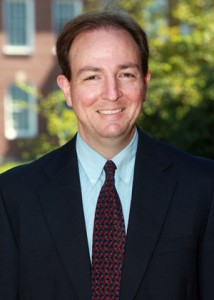 precisely that kind of grammar which is needed if the world is to engage in this discussion of it’s future” Â Bl. Pope John Paull II
precisely that kind of grammar which is needed if the world is to engage in this discussion of it’s future” Â Bl. Pope John Paull II
[powerpress]
WOL1 – Episode 1 – What is “liberal modernity”?  Maybe not so modern?  The revolution in political philosophy…like the thought of  Thomas Hobbes, John Locke…what is “good” and what are the problems.  Why is it important to discern between “self-interest” and the dignity of each human person?  Why is Bl. John Paul’s thought relevant to Western Liberalism?  What is the “Culture of Death” and the climate of moral confusion?  The moral law is the path to life.
The Way of Life, Carson Holloway examines the fundamental philosophers of modernity-from Hobbes to Toqueville-to suggest that John Paul II’s critique of modernity is intended not to reject, but to improve. Thus, claims Holloway, it is appropriate for liberal modernity to attend to the Pope’s thought, receiving it not as the attack of an enemy but as the criticism of a candid friend.
 Â
This series is based on Dr. Holloway’s book “The Way of Life”
Tags: catholic, catholic podcast, catholic prayer
This entry was posted on Wednesday, March 5th, 2014 at 8:22 am
You can follow any responses to this entry through the RSS 2.0 feed.
Fr. Maciej Zieba, OP offers tremendous insight and a wonderful resource in understanding the heart of Catholic 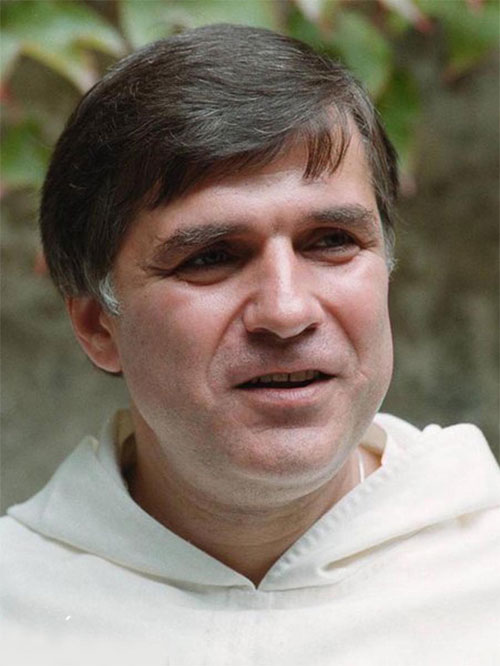 Social Teaching in regards to democratic capitalism.  In Papal Economics: The Catholic Church on Democratic Capitalism, from Rerum Novarum to Caritas in Veritate, he gives an overview the key social encyclicals  from Leo XIII’s Rerum Novarum (1891), through John Paul II’s Centesimus Annus a century later, and finally to Benedict XVI’s Caritas in Veritate (2009). While demonstrating the continuity among the popes,  this work also reveals that the Church’s teaching has evolved in certain key respects—particularly in its judgment on socialism.  Fr. Zieba, a close associate of Pope John Paul II.  He was a key player in the Polish Solidarity movement and is the director of the European Solidarity Center and the founder of the Tertio Millennio Institute in Poland.
Social Teaching in regards to democratic capitalism.  In Papal Economics: The Catholic Church on Democratic Capitalism, from Rerum Novarum to Caritas in Veritate, he gives an overview the key social encyclicals  from Leo XIII’s Rerum Novarum (1891), through John Paul II’s Centesimus Annus a century later, and finally to Benedict XVI’s Caritas in Veritate (2009). While demonstrating the continuity among the popes,  this work also reveals that the Church’s teaching has evolved in certain key respects—particularly in its judgment on socialism.  Fr. Zieba, a close associate of Pope John Paul II.  He was a key player in the Polish Solidarity movement and is the director of the European Solidarity Center and the founder of the Tertio Millennio Institute in Poland.
[powerpress]
You can find the book here
“For a long time to come, this book may well be the definitive work on the economic teaching of the modern popes.” —Michael Novak
“Powerful . . . Should move the Catholic discussion of twenty-first-century economics beyond the familiar refrains†—George Weigel
Tags: catholic social teaching, Maciej Zieba, Rerum Novarum
This entry was posted on Sunday, January 26th, 2014 at 12:09 am
You can follow any responses to this entry through the RSS 2.0 feed.
[powerpress]
We discovered an incredible audio of a conference talk given in the late 70’s by the Baroness herself, Servant of God Catherine de Hueck Doherty.  She is  co-founder of the Madonna House Apostolate and one of our absolute favorite authors.  We dare you not to be moved by her words!
Reflection on Catherine’s talk by Omar Gutierrez:
Catherine de Hueck Doherty speaks with the kind of prophetic fire that one imagines would have poured from the mouth of Isaiah or out of the minds of the early Church fathers. Her spirit and message are as thoroughly Catholic as any you have ever heard. With the kind of salty swagger of a woman who knew what it was to live with the poorest of the poor, she understood intimately what it meant to live the social teaching of the Church. “Service without prayer,†she says, “is paternalism, social service work, something that the poor do not accept.†“In order to do what we must do, in order to be what we must be we have to pray.â€
As she loudly asks why it is that our cities do not applaud and cry at the manifest love for the poor that should be there but isn’t, and demands that we pray for the souls of the owners of multi-million dollar corporations, and points out the “stupid†behavior of Church governors she can at the same time turn around and insist that we all have the faith of a St. Perpetua in order to renew the ancient Church. She demands that we pray for our priests who are manifestations of God’s love for us. “We don’t need psychiatrists from our priests. We don’t need counselors from our priests. We need priests to take us by the hand and lead us to sanctity.â€
Doherty is a lioness, a spirit that could move mountains. We would all do well to listen to her advice and seek union with Christ in His Church and in obedience to the teachings therein. So, in Catherine’s words, “Get crackingâ€!
Tags: audio, Church, Hueck Doherty, love, Madonna House, obedience, priests
This entry was posted on Tuesday, December 31st, 2013 at 7:28 am
You can follow any responses to this entry through the RSS 2.0 feed.
“What’s a Person to Do? Everyday Decisions That Matter” is an important work for those who seek to navigate through life’s 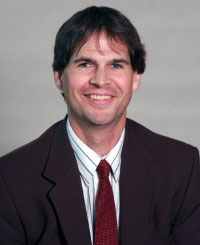 daily choices. Dr. Mark Latkovic, who is a professor of moral and systematic theology at Sacred Heart Major Seminary in Detroit, Michigan, does a fantastic job bringing forward basic principles that should be a part of our discernment process in making decisions.- especially when there is no definitive Catholic teaching on a subject. Applying those principles, he then takes a look at 40 different questions and answers. Whether it’s areas of Facebook and Internet interaction, purchasing lottery tickets or giving to particular “charities”, or how we deal with decisions for children and for elderly parents, Dr. Latkovic challenges us to ask important questions and respond to issues with moral virtue. With an engaging and accessible writing style, Dr. Latkovic provides an important resource for us all.
daily choices. Dr. Mark Latkovic, who is a professor of moral and systematic theology at Sacred Heart Major Seminary in Detroit, Michigan, does a fantastic job bringing forward basic principles that should be a part of our discernment process in making decisions.- especially when there is no definitive Catholic teaching on a subject. Applying those principles, he then takes a look at 40 different questions and answers. Whether it’s areas of Facebook and Internet interaction, purchasing lottery tickets or giving to particular “charities”, or how we deal with decisions for children and for elderly parents, Dr. Latkovic challenges us to ask important questions and respond to issues with moral virtue. With an engaging and accessible writing style, Dr. Latkovic provides an important resource for us all.
[powerpress]
You can find the book here
This wonderful little book is a bracing wake-up call to those of us who often overlook the moral dimensions of the decisions we make in everyday life. Mark Latkovic not only wakes us up, but gently guides us through the ethical minefield of contemporary society. —Mary Ann Glendon, Learned Hand Professor of Law at Harvard Law School
This little gem of a book is not only a reliable guide to resolving some of the ethical questions we face in our everyday lives, it is a guidebook to thinking well about decisions that shape our characters. It provides answers to specific ethical problems, but that is only part of the story. What Professor Latkovic is doing is teaching us by example how to think deeply and well about the moral dimensions of our lives. —Robert P. George, McCormick Professor of Jurisprudence, Princeton University
Tags: choices, Harvard Law School, Mark Latkovic, virtue, work
This entry was posted on Wednesday, October 30th, 2013 at 1:05 pm
You can follow any responses to this entry through the RSS 2.0 feed.
“Conscience and It’s Enemies: Confronting the Dogmas of Liberal Secularism” is one of the best articulations of today’s battle over religious liberty and 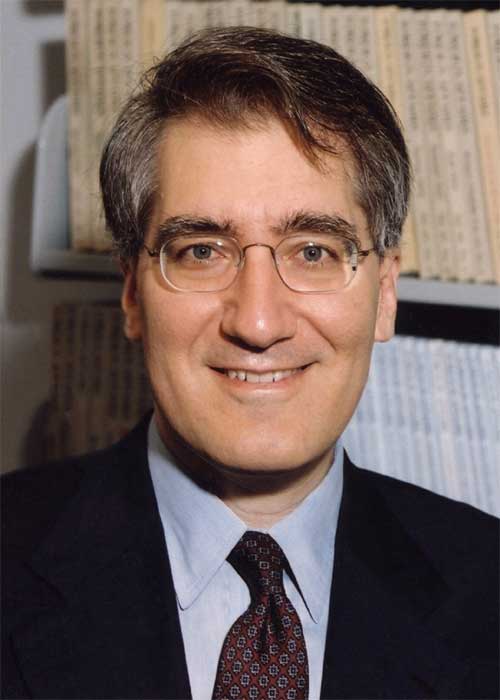 traditional morality.  Dr. Robert George’s clarity and insight is indispensable for  understanding where we have been, where we are going, and what paths we could be traveling down if we fail to action on the leading morality challenges facing as individuals and citizens.  Pass by this book and it’s message at your own risk.
traditional morality.  Dr. Robert George’s clarity and insight is indispensable for  understanding where we have been, where we are going, and what paths we could be traveling down if we fail to action on the leading morality challenges facing as individuals and citizens.  Pass by this book and it’s message at your own risk.
As the book description states: “In defending what James Madison called the “sacred rights of conscienceâ€â€”rights for which government shows frightening contempt—George grapples with today’s most controversial issues: abortion and infanticide, same-sex marriage, genetic manipulation, euthanasia and assisted suicide, religion in politics, judicial activism, and more. His brilliantly argued essays rely not on theological claims or religious authority but on established scientific facts and a philosophical tradition that extends back to Plato and Aristotle.”
[powerpress]
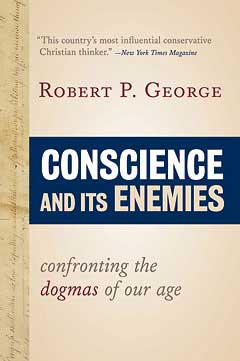 You can find it here
You can find it here
“One of the most incisive legal and moral thinkers working today.†—First Things
“One of contemporary conservatism’s intellectual pinups.†—George F. Will
“Professor George has helped strengthen our nation’s system of ordered liberty by exploring enduring questions of American constitutional law and Western political theory.†—President George W. Bush, in awarding the Presidential Citizens Medal
Tags: catholic, catholic podcast, catholic prayer
This entry was posted on Monday, June 24th, 2013 at 7:38 am
You can follow any responses to this entry through the RSS 2.0 feed.
I leave it to Omar F. A. Gutierrez to write so well on the life,  times, and death of this great saint.
times, and death of this great saint.
You may perhaps remember a scene from Braveheart with Robert the Bruce and his father the leper.
When his son first brings him news about the rebellion led by William Wallace, a commoner, the father instantly devises a plan by which the Bruce clan can gain favor with the Scots and with the English. You get the feeling that Robert is a bit taken aback by the so easy and cold calculation of his rotted father.
He says,
This Wallace. He doesn’t even have a knighthood. But he fights with passion, and he is clever. He inspires men.
His father replies:
You admire him. Uncompromising men are easy to admire. He has courage. So does a dog. But you must understand this: Edward Longshanks is the most ruthless king ever to sit on the throne of England, and none of us, and nothing of Scotland, will survive unless we are as ruthless, more ruthless, than he.
“Uncompromising men are easy to admire.†There is in this world, and it seems more so today, a habit of admiring the compromising fellow. With the ubiquitous dictatorship of relativism that oppresses so many minds, it only makes sense that the general public would take offense at anyone who dares stand up for something with uncompromising stolidity.
The holder of objective truth claims is – so the sages of Manhattan and Melrose Place tell us – no different than the Nazi who insists on the claim to racial purity or the Islamic bomber who literally does cling to his religion and guns.
For this reason, the figure of St. Thomas More, whose feast it is today, can be such a 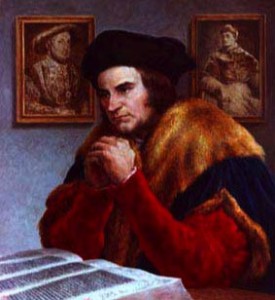 perplexing figure for the modern mind. And even the Catholic who consumes their breakfast whilst pouring over the latest moto proprio can miss this astonishingly great man. I have to admit having skipped over him in my studies, chalking him up with all the other saints and blesseds who gain God’s favor by losing their heads. But St. Thomas More is more than just a martyr.
perplexing figure for the modern mind. And even the Catholic who consumes their breakfast whilst pouring over the latest moto proprio can miss this astonishingly great man. I have to admit having skipped over him in my studies, chalking him up with all the other saints and blesseds who gain God’s favor by losing their heads. But St. Thomas More is more than just a martyr.
He’s an example of such exquisite lack of compromise that he can teach us a great deal about the Catholic Social Doctrine we long to understand and live out. (more…)
Tags: children, england, english reformation, love, martyr, martyrdom, protestant reformation, tudors
This entry was posted on Saturday, June 22nd, 2013 at 6:32 am
You can follow any responses to this entry through the RSS 2.0 feed.


